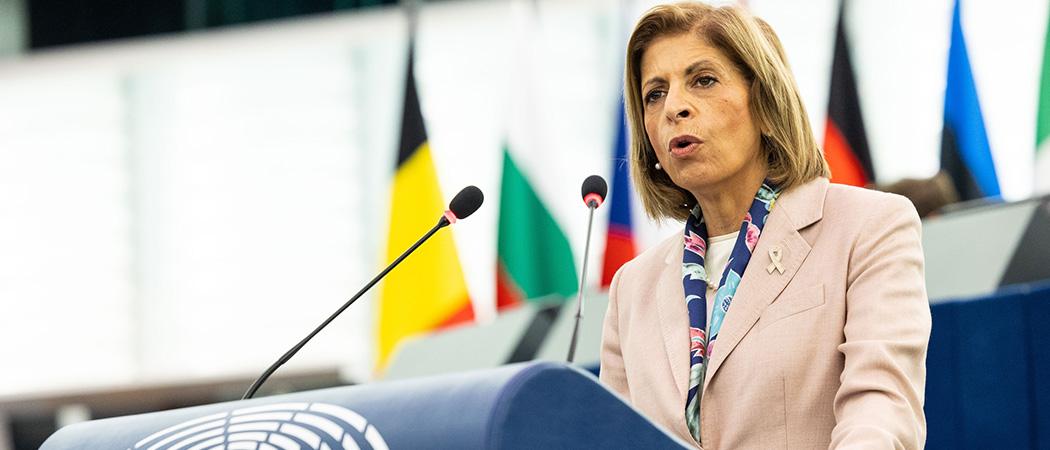EU health commissioner downplays concerns of ‘democratic deficiencies’ in the setup of HERA, as the European Parliament demands more transparency and a greater say in how the authority operates

Stella Kyriakides, EU Health Commissioner. Photo: European Union
MEPs raised concerns about the lack of independence of the European Commission’s brand-new Health Emergency Preparedness and Response Authority (HERA) when they grilled EU health commissioner Stella Kyriakides over its structure, operations and remit on Tuesday.
HERA is due to launch in 2022 with a dedicated budget of €6 billion up to 2027 and a further €24 billion from other EU programmes. It will be set up as an internal organisation within the Commission, coordinating the development, production and distribution of drugs, vaccines and medical equipment during health emergencies, and supporting research to develop new medical countermeasures, including EU-wide clinical trial networks and sharing of health data.
While they broadly support this remit, MEPs would prefer HERA to be an independent agency, allowing them a greater say in its operations.
In the current format, parliament will have little control over how HERA operates, said Danish MEP Margrete Auken. In particular she said, there needs to be more openness about contracts with pharmaceutical companies. “We are not transparent vis-à-vis these purchasing agreements, there is no transparency about the public financing, or the enterprises, or the vaccine prices,” Auken said.
Reducing the role of parliament to an observer “is not in line with the spirit of cooperation that should guide us,” said French MEP and member of the Renew Europe group Véronique Triller-Lenoir.
MEPs’ demands have been fuelled by the Commission’s refusal to disclose details of multi million euro advanced purchase agreements for COVID-19 vaccines it negotiated with pharmaceutical companies on behalf of all member states.
MEPs also criticised the agreements for failing to include a requirement to share know how, data and technologies created with the help of public research funding. Parliament is in the midst of negotiating a new pharmaceutical strategy and MEPs have already called for measures to force companies to invest more of their profits in R&D and agree to more flexible intellectual property rules.
“It's worrying that, despite the scandals [….], the Commission has decided once again to overlook this European Parliament,” said conservative MEP Vincenzo Sofo.
In its defence, the Commission says setting up HERA as an agency would have taken at least three years to complete. In addition, when it was first proposed, EU member states had just wrapped up intense negotiations over the EU’s multiannual budget. By establishing HERA as an internal service, the Commission was able to make use of existing budget lines.
The setup of the new health authority has “some democratic deficiencies”, said German Christian-Democrat MEP Peter Liese. “We accept this, but for a limited time, and then we want a real legislative procedure, with the parliament as co-legislator,” he said.
The functioning of HERA is scheduled to be reviewed and adapted on an annual basis until 2025, when a full review will be carried out.
The Slovenian presidency of the EU council said it also intends to organise a debate on the transparency and the use of funds in HERA.
Replying to MEPs, Kykriakides noted parliament will be able to negotiate the final budget and will have an appointee on the board of HERA. She has already invited the chair of the parliamentary committee on Environment, Public Health and Food Safety (ENVI) to nominate a board member. “There will be an open and frank and systematic dialogue on all of HERA’s operations,” Kyriakides said.
What of the European Centre for Disease Control?
Others MEPs questioned whether the EU needs a new body for dealing with health risks, given tackling cross border health threats is the primary reason why the European Centre for Disease Prevention and Control was set up.
Joanna Kopcinska, parliament’s rapporteur on expanding the mandate of ECDC, said that rather than a new body, the responsibilities of HERA could have been added to ECDC’s remit.
ECDC’s remit is already changing, with MEPs voting through a proposal to extend its mandate beyond communicable diseases to cover cardiovascular and respiratory diseases, cancer, diabetes, and mental illness earlier this month. The reform will also mandate member states to come up with national preparedness and response plans and provide the ECDC with better epidemiological data.
MEPs are demanding more clarity on the division of labour between HERA and ECDC. “We can do this by clearly defining the tasks of the HERA board, which will be made up of representatives of all member states and representatives of the institutions that are responsible for the functioning of the authority,” said Kopcinska.
MEPs also wanted to know how HERA would be staffed and whether the Commission will move experts from its health directorate general, DG Sante, from ECDC, or from the European Medicines Agency (EMA).
Kyriakides said the Commission is in the process of hiring new people and “will not be stealing staff” from existing agencies. “We will be recruiting new staff, and we'll be working with member state experts on a memorandum of understanding in terms of how to govern the cooperation [and] collaboration between EMA and ECDC,” she said.
Next week, the ENVI committee will hold a debate on reinforcing EMA, discuss the updated ECDC legislation and adopt a draft report on a new pharma strategy for Europe.





 A unique international forum for public research organisations and companies to connect their external engagement with strategic interests around their R&D system.
A unique international forum for public research organisations and companies to connect their external engagement with strategic interests around their R&D system.